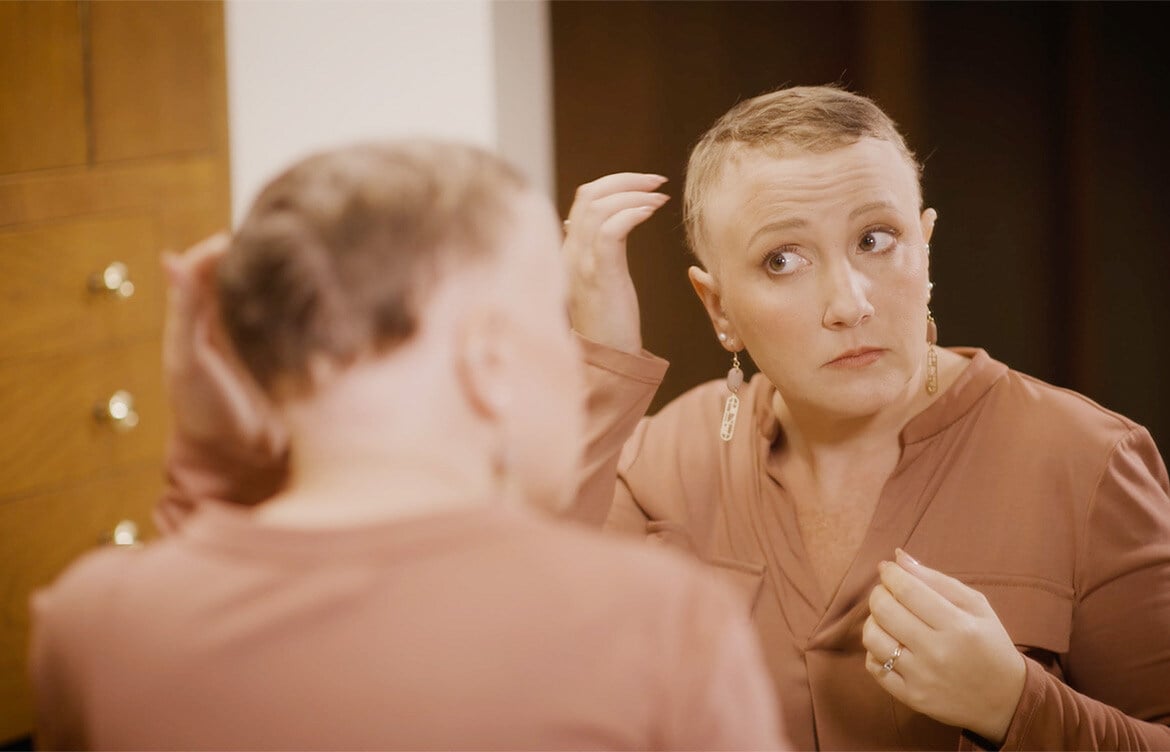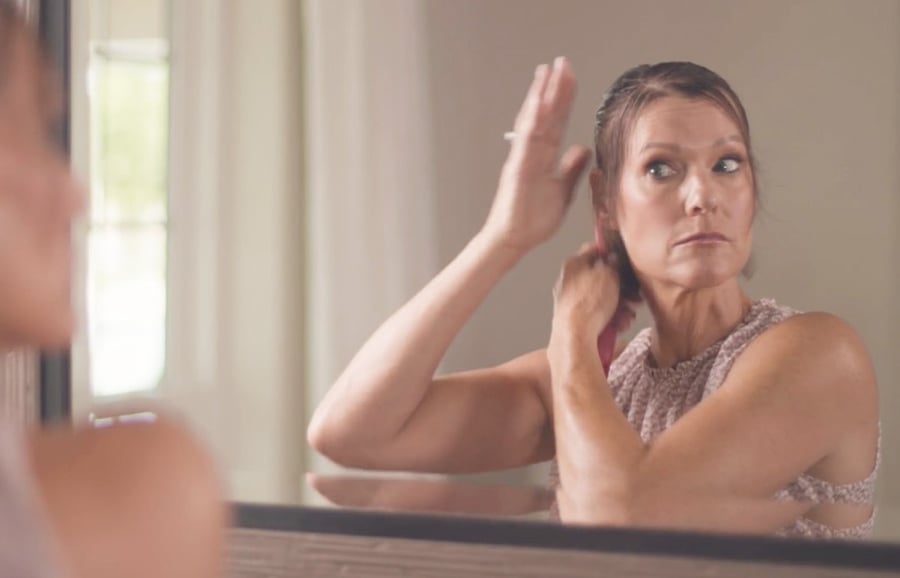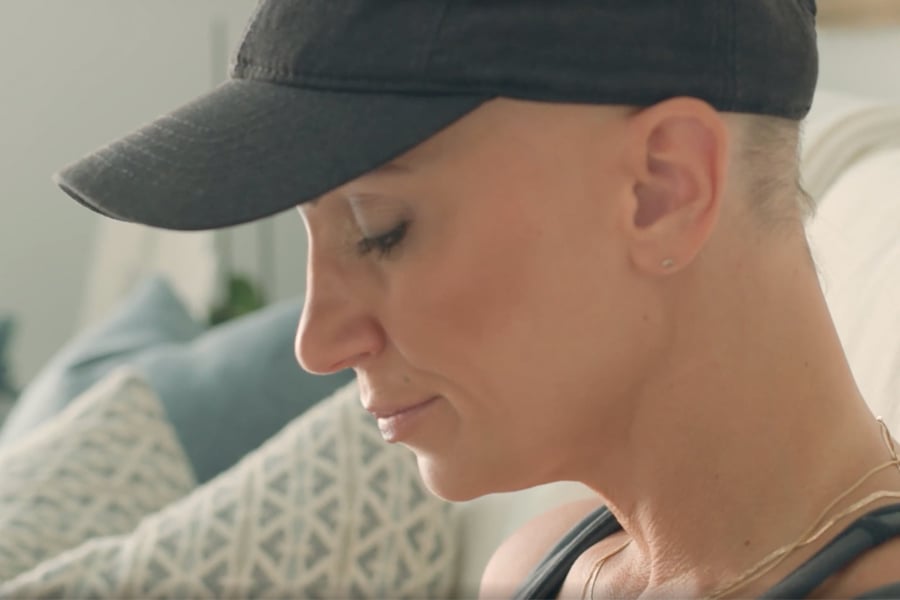The Silent Struggle of Women with Thinning Hair

She stands in the drugstore aisle for 10 minutes, scanning labels on thickening shampoos she knew wouldn’t work. Dry shampoo. Root powder. Volumizing mousse. She picks one up, glances around, and tucks it into her basket like it was something shameful.
She has never said the words out loud: “I’m losing my hair.”
For millions of women, thinning hair is a silent struggle. Whether it starts after childbirth, during menopause, or alongside a diagnosis like alopecia or cancer, the emotional toll is often heavier than the physical one. And yet, unlike men’s hair loss, it’s rarely talked about openly.
Why do so many women hide their hair loss, even from their closest friends?
In this article, we’ll explore the unspoken realities of female hair loss: why it remains such a taboo, how it affects women emotionally, and what solutions exist to help women feel like themselves again.
If you’ve ever whispered about your hair thinning or felt alone in your experience, this article is for you.
Hair Loss Among Women - A Silent Struggle


Despite its commonality, hair loss in women remains a topic shrouded in silence. Studies reveal that more than 50% of females will experience noticeable hair loss during their lifetime. This issue transcends age, affecting women in their 20s through their 70s and beyond.
- Postpartum hormonal changes
- Alopecia areata and other autoimmune conditions
- Thyroid disorders and hormonal imbalances
- Stress-related shedding (telogen effluvium)
- Chemotherapy treatments
- Perimenopause and menopause transitions
Yet, a quick search on "hair loss" predominantly yields images and discussions centered around men. While society has normalized male baldness, even coining terms like "male-pattern baldness," the narrative surrounding female hair loss remains underrepresented. This lack of visibility contributes to the stigma and isolation many women feel when confronting their own hair loss journey.
Why Hair Loss in Women Is Still So Hard to Talk About

For many women, hair loss feels like more than a cosmetic issue, and unlike other visible health changes, hair thinning is often treated as something to hide, not discuss. But why is that?
Cultural Beauty Standards
Hair has long been tied to femininity, health, and even desirability. From childhood, women are praised for “long, thick hair” and conditioned to see it as a core part of their beauty. Losing it challenges that idea and can feel like losing a part of yourself.
Lack of Representation
Despite how widespread it is, female hair loss is rarely shown in media or advertising. When it is, it’s often in the context of extreme illness, not everyday realities like postpartum changes or menopause. This creates a false narrative that “normal” women don’t lose hair.
Language
Unlike men, who are often bluntly described as “balding,” women tend to soften the language around their experience. They say “my hair is thinning,” “I just need volume,” or “it’s a little sparse”, as if acknowledging the truth out loud makes it more real.
Social Media Pressure
With curated images and beauty filters, social media reinforces the idea that every woman should have full, flowing hair every day. It leaves little room for honesty or vulnerability around hair struggles, even among close friends or family.
This silence delays support, guidance, and access to solutions that could help women feel more like themselves again.
The Emotional Toll of Hair Loss in Women

The emotional impact of hair loss can be significant, even if the physical changes seem subtle to others.
A Quiet Loss of Confidence
Many women describe hair thinning as something that makes them shrink inside themselves. It might start with avoiding mirrors, skipping social events, or dreading windy days. Some begin altering how they style their hair, always looking for ways to cover the thinning areas, and often with rising anxiety.
Impact on Relationships and Identity
For some, hair loss affects intimacy, dating, and even communication with their partners. When your appearance shifts in a way that feels out of your control, it can ripple into every aspect of your self-image.
Mental Health Effects
Studies have shown that women with hair loss are more likely to experience depression, anxiety, and lower self-esteem. It’s often dismissed by others as “just hair,” but for the person experiencing it, the emotional weight is real and valid.
The Isolation Factor
Perhaps the hardest part is how isolating it can be. Because so few women talk openly about their hair loss, many feel like they’re the only one going through it. The silence, more than the hair loss itself, can be the most damaging.
How Women Are Quietly Changing the Hair Loss Narrative

Though the silence around female hair loss has deep roots, there’s a growing shift in how women are responding, not just by hiding the issue, but by redefining what it means to live with it.
Wigs and Toppers as Tools of Empowerment
Rather than seeing wigs and toppers as a last resort or something to be ashamed of, many women are now embracing hairpieces as proactive, confidence-restoring solutions. These are not the heavy, unrealistic wigs of the past. Today's high-quality options offer softness, realism, and comfort designed specifically for women with medical or hormonal hair loss.
Supportive Spaces and Stories
Specialist wig salons, alopecia communities, and online forums are giving women space to share their experiences without judgment. The more women speak openly, whether it’s through a social post, a salon visit, or a quiet conversation, the more they normalize the reality of hair loss.
Redefining Beauty on Their Own Terms
Hair is deeply personal. Some women choose wigs that replicate their natural look. Others opt for a new style altogether. Some go without and embrace their bare scalp. The common thread? It’s their choice - not society’s.
These small acts of personal agency are how the narrative begins to change. Not through a viral campaign, but one decision, one voice, one woman at a time.
What Happens When We Start Talking About Women’s Hair Loss Out Loud?
When women stop whispering about hair loss, something powerful happens: shame gives way to shared experience, and isolation turns into informed choice.
Thinning hair isn’t a rare condition. It's a common reality, experienced at every age and stage of life. And while the emotional impact is real, so is the possibility of reclaiming confidence with the right support, the right tools, and the right understanding.
Whether that journey leads to a topper, a luxury wig, or simply more self-compassion, every woman deserves to feel like herself again - without compromise.
Understanding how wigs are made, from the first strand to the final fit, can also be part of that healing process. Seeing the craftsmanship behind every piece, often changes how people feel about wearing one. It becomes less about hiding and more about honoring what you’ve been through and where you’re going next.

.jpeg)

